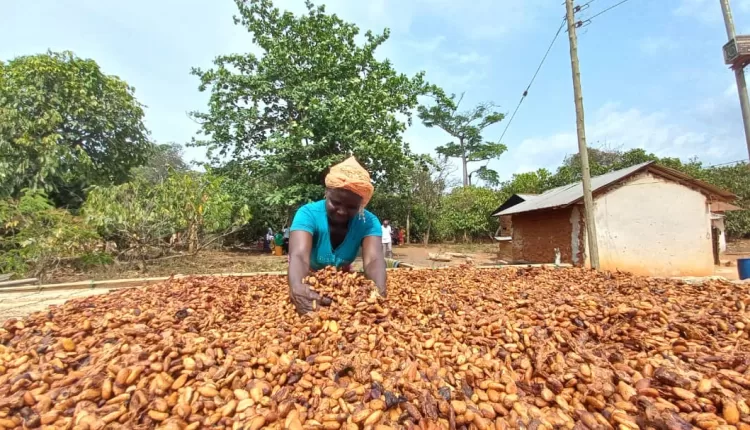‘Big Chocolate’ is booking huge profits while failing to pay prices that support a living income for cocoa farmers in Ghana, reveals new analysis by Oxfam in commemoration of World Fair Trade Day, on May 13.
According to Oxfam, the world’s four largest public chocolate corporations, Hershey, Lindt, Mondelēz and Nestlé, have together made nearly $15 billion in profits from their confectionary divisions alone since the onset of the pandemic, up by an average of 16 percent since 2020.
They paid out on average more than their total net profits (113 percent) to shareholders between 2020 and 2022.
The combined fortunes of the Mars and Ferrero families, who own the two biggest private chocolate corporations, are said to have risen by $39 billion since 2020.
They together command a combined net worth of around $157 billion.
Oxfam’s study which surveyed over 400 cocoa farmers across Ghana found that their net incomes have fallen on average by 16 percent since 2020, with women’s incomes falling by nearly 22 percent.
Nine out of ten farmers said they are worse off since the pandemic, even as chocolate profits rise.
The report reveals, up to 90 percent of Ghanaian cocoa farmers do not earn a living income, meaning they cannot afford enough food or other basics such as clothing, housing and medical care.
Many of the estimated 800,000 farmers in the country survive on less than US$2 a day.
“There’s big money in chocolate —but definitely not for farmers,” said Oxfam International interim Executive Director Amitabh Behar.
“Cocoa farmers work extremely hard, under gruelling conditions, yet can’t always feed their families,” he further observed.
Oxfam said it analyzed the sustainability programs of ten of the top chocolate manufacturers and traders operating in Ghana, all of which prioritise helping farmers produce more cocoa.
However, Oxfam found that none of these programs achieved their stated goal of increasing cocoa production and, consequently, boosting farmer income.
“In fact, the crop yields of farmers in the corporations’ supply chains declined by 25 percent between 2020 and 2022,” said the advocacy group.
Similarly, Oxfam found that none of the premiums —an extra sum paid directly to farmers on top of the selling price— paid by the corporations meaningfully increased farmers’ incomes.
Cocoa farmers surveyed by Oxfam said they are being paid a premium of $35 to $40 per ton of cocoa.
The average cocoa farmer in Ghana produces about one ton of cocoa annually. They need to earn $2,600 more per year to get a living income.
After decades of pledges to rid their supply chains of child labour, poverty and deforestation, chocolate corporations’ failure to pay prices that ensure a living income —let alone protect farmers’ incomes from free-falling— is another setback to global efforts to make chocolate more sustainable and ethical.
More and more cocoa farmers are selling their land to illegal miners or turning to polluting ‘galamsey’ (artisanal mining) to supplement or replace their incomes.
“Chocolate giants need to put their money where their mouth is,” said Behar.
“They must rid themselves of their colonial legacy of extracting raw materials and keeping farmers in poverty while making astronomical profits for their rich shareholders.
Without fair pricing and living incomes, there will never be such a thing as ‘sustainable’ or ‘exploitation-free’ chocolate,” stressed the Oxfam boss.
According to the International Cocoa Organization (ICCO), Ghana produces around 15 percent of the world’s cocoa beans but receives only about 1.5 percent ($2 billion) of the chocolate industry’s estimated annual worth of $130 billion.
Around 60 percent of the world’s cocoa heads to the Europe Union, making the trade block the world’s largest importer of the commodity.
“Chocolate corporations need to close the living income gap for farmers. End of story” said Behar.
“They must significantly increase farm-gate prices paid to farmers, and mitigate the impact of inflation on the rising costs of farming inputs and equipment. Transparency about their prices and premiums is also a bare minimum.”
In April 2023, the European Parliament approved a new law that will allow the sale of cocoa and other commodities in the EU only if the supplier has issued a “due diligence” statement confirming that the product does not come from deforested land or has led to forest degradation.
- Illegal Mining Threatening Ghana’s $230M Cocoa Rehabilitation - April 10, 2024
- Ghana Raises Cocoa Farmgate Price by 58.26% to GHC2,070 per bag - April 5, 2024
- New Standard for Measuring Cocoa Household Income Launched - April 5, 2024
